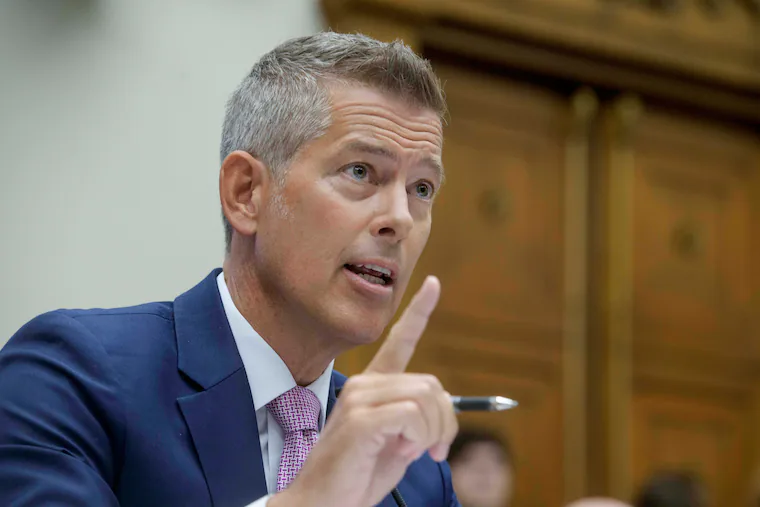Copyright The Philadelphia Inquirer

With children across the Delaware Valley celebrating Halloween, I want to urge readers to pay extra attention tonight while driving. Halloween is the deadliest day of the year for child pedestrians, and reckless and inattentive motorists are to blame. Slow down, put away your phone, turn on your lights, and keep your eyes out for the tiny humans in costumes. Now, onto our regularly scheduled programming, covering a spooky letter sent to SEPTA, and scary ideas coming from City Council. Duffy’s demands Transportation Secretary Sean Duffy sent a curious letter to Gov. Josh Shapiro and SEPTA General Manager Scott Sauer. The letter brought up the surge in fires on the Regional Rail lines, and Friday’s federal deadline to inspect all 225 Silverliner IV train cars. Duffy said the federal government would not allow riders to experience unsafe conditions, chided the agency for shifting capital dollars to cover operating costs, criticized SEPTA’s tenuous fiscal situation, and expressed the need for a sustainable funding solution for transit. I agree with much of his criticism; he just addressed the letter to the wrong people. After all, it is not Sauer or Shapiro who have stood in the path of sustainable funding for public transit, or claimed SEPTA has enough money to accomplish its goals already. State Senate Republican leaders Joe Pittman and Kim Ward, local attorney George Bochetto, Common Pleas Court Judge Sierra Thomas-Street, and consumer advocate Lance Haver are the ones who needed to hear the message. SEPTA is now caught between multiple forces beyond its control. Its aging equipment will increasingly struggle to pass safety inspections. The state government in Harrisburg is held hostage by people who insist the agency, which has received fewer resources than any of its peers, has been given more than enough money already (an assessment with which the courts seemingly have agreed). A new lawsuit even threatens the system’s ability to raise fares, the only source of revenue fully under its control. Unless urgent action is taken soon, those of us here in the southeastern corner of the commonwealth could lose much of our Regional Rail network to deferred maintenance. Deferred maintenance increasingly hard to ignore My newsroom colleagues have created an eye-opening digital feature on the Silverliner crisis. The piece underlines a critical point that is often overlooked in the public transit funding debate. SEPTA being short of resources is not a new phenomenon. They’ve been doing more with less for decades. In Atlanta, MARTA is going to spend the majority of its revenue on capital costs. The Massachusetts Bay Transportation Authority in Boston is spending around 40% of its budget on capital costs, and another 10% on debt service. The Washington Metropolitan Area Transit Authority in D.C. splits its revenue almost equally between operations and expenses. Meanwhile, SEPTA officials are spending two-thirds of their 2026 budget on operating costs, leaving virtually no room for maintenance, let alone the expansions other cities have benefited from. Unless this changes, the threat to SEPTA’s future remains. Do-nothing Council is better than do-something Council Earlier this year, my newsroom colleagues Sean Collins Walsh and Jake Blumgart wrote a piece mentioning the fact that City Council has increasingly met without approving any legislation. Others have long bemoaned the body’s enthusiasm for honorary presentations and resolutions. My view, however, is that this is a positive development. After all, how often do you hear about City Council passing legislation that hurts Philadelphia, vs. legislation that helps? Just look at some of the ideas introduced over the last few weeks. Councilmember Jim Harrity (D., Bob Brady’s pocket) held hearings about the soda tax, urging the city to look into a repeal of the fee. No one likes paying taxes or having their industry singled out for a new levy. But the research is clear: The soda tax is working. The tax is reducing consumption of sweetened, carbonated beverages, which is a positive for public health. It is also providing needed money for the city’s pre-K program and playgrounds. Thankfully, Harrity faced pushback from the mom squad of Rue Landau, Nina Ahmad, and Kendra Brooks. Meanwhile, a different coalition of district Council members wants to ban personal care homes. Brian O’Neill and Mike Driscoll introduced a bill that would restrict them throughout Northeast Philadelphia, and City Hall sources suggest Councilmembers Mark Squilla, Quetcy Lozada, and Cindy Bass are also interested in adding their districts to the ban. Lozada is also trying to ban pharmacies and convenience stores from her district, in a misguided attempt to combat the drug trade. Then there’s the “quarrelsome contrarian,” Jeffery “Jay” Young. He introduced a bill that eliminates penalties and interest for nonpayment of water bills, effective next year. This would reduce payment rates immediately, depriving the department of needed revenue. Young also implied the city should take over maintenance of water laterals — pipes that connect the main underground water line to a building’s water supply — which are currently the purview of property owners. This would mean adding untold billions worth of liabilities to the Water Department. A birthday surprise Council President Kenyatta Johnson moved to end Thursday’s Council session, only to discover the addition of four new speakers. The mystery guests turned out to be his wife, Dawn Chavous, and three musically inclined friends. The quartet sang “Happy Birthday” to Johnson, and Chavous extolled his virtues in prose. What a difference three years can make. In fall 2022, the couple were being tried on federal bribery charges, for which they would be acquitted. Today, Johnson is not only Council’s leader, but also the betting favorite to serve as the city’s 101st mayor. Johnson has also shifted his approach, eschewing some of the parochial rhetoric that characterized his tenure before his acquittal, in favor of a more open-minded approach. If only some of his colleagues would learn from his example.



